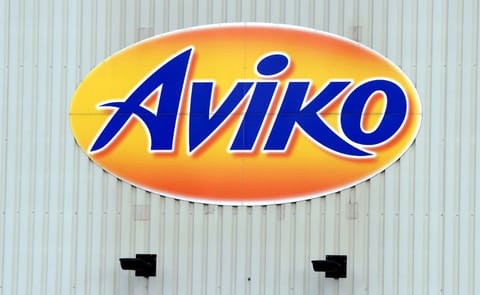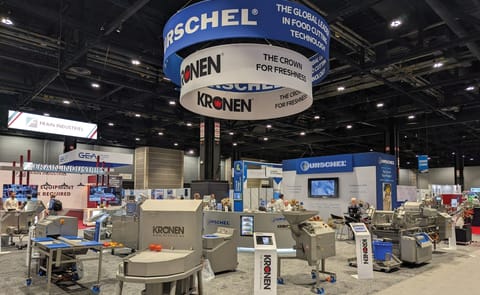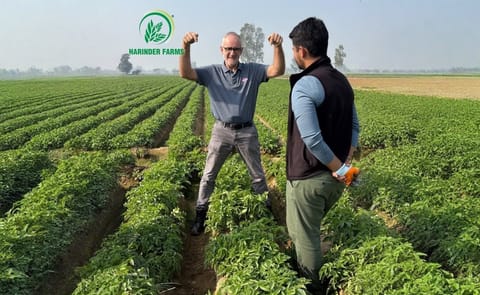Piet de Bruijne, director at Farm Frites
Piet de Bruijne (Farm Frites): 'Building personal relationship results in success in foreign markets'

Of course. Your product must be correct. There must be a need in the export market, which you have been looking at. Also you need to satisfy all requirements in all kinds of areas, from documentation to and including phytosanitary. But without going there and building a personal relationship one will not be successful in a foreign market. A discussion with Piet de Bruijne of Farm Frites about the approach to internationalization follows...
Farm Frites is worldwide one of the top five suppliers of chips and related products and the third largest potato processor. We also started small just like everybody else. The present director, Piet de Bruijne, is fully aware of that start. On the basis of his own experience in the company from the eighties he now finds internationalization and exporting a lot less pioneering than at that time.
"One knew nothing. If you go back that far.... I remember that I went to Spain and walked from one market to the next. Also one tried to place as many adverts in trade journals as possible to find people willing to sell your chips. Today, so much information is available via internet, that one can form a complete picture of a potential export market even before ever arriving there."
To foreign market
Where possible, Farm Frites establishes its own production locations close to or at foreign markets and uses a chain approach, i.e., - their own potato fields with their own potato varieties up to and including their own factory in the country of settlement. Where to start? "In Egypt this was reasonably simple. An agro and food group from Kuwait approached us. They wanted to start a chip factory and asked us if we wanted to be part of it. From that location we supply the area from Morocco to Iraq. Or Russia - one of our big clients is busy there. If nothing is organized for the supply of their raw material, in our case chips, a client like that is very happy that you are a regular and trusted supplier helping out. That they receive the required quantity and quality of chips every day is already unique. We are even busy preparing for the cultivation there."
De Bruijne attaches a lot of value to innovation. "We try and do as much as possible with the potato. On the one side add value and on the other to develop as many products as possible. We have cooled and frozen products;not everybody does this. As we export to so many countries one has to follow local and regional requirements and wishes and everything in the Arab region has to be halal. Locally, there are various consumer preferences. With us seven employees are fully occupied with this. There is already much innovation on the theme of sustainability. We grow everything ourselves abroad, protect the energy story and are bio-based as far as possible at the moment. In addition there is the manner of preparation, the health aspect and then one tries to think of nice things for the plate. Consequently there are a lot of things to think about at the same time.
We use various potato varieties, which were and are being developed with our cooperation. New varieties are already less of a burden, because of their higher yield per hectare and are more durable because less water, pesticides and fertilizer are required. The Netherlands have the best agriculture with its chain approach in the world. Only abroad this is not a fall-back position. Therefore, except in the Netherlands, we attend to the cultivation ourselves. If one does not, there's no chips factory. In order to give you some idea of the period you may think, we now already have testing fields in countries where possibly in 15 years time one of our factories will be."
International business
What does de Bruijne think of doing business with 'foreign' cultures from his own experience? "What is noticeable is that almost everywhere in the world the personal relationship is of more importance than in the Netherlands. Here everything is controlled by regulations. People buy trustingly via Internet, even on Marktplaats." In most countries there is unfortunately no full set of certainties, such as law and rules, just to mention. "One must therefore really invest in the personal relationship because that is the manner in which business is done abroad. Keep your word, that is important in the relationship. Also do not promise more than you can deliver.
The challenge is different in each country. One has to go there, listen well and meet the needs. Know how the country works and what the possible obstacles are. This is not at all complicated. The step abroad is no longer a jump like in the past. The world is a lot smaller. Actually there are not too many barriers left, in case of a problem enlist the help of the Landbouwraad or his or her office. But do not only phone when in trouble, but keep them well informed about your activities, so that you have support as well."
He continues: "One has to find a solution so that one can work cost-efficiently. A big company can survive one or two years of starting losses, a smaller company cannot. Try as a starter to learn from people in a foreign market, who already went into that specific market. Sometimes I think that certain knowledge and experience are not available as well as previously. But each entrepreneur wants to help another entrepreneur as long as he is not a competitor. An extra advantage is a smallish company, which is often still a family company just like Farm Frites. This is of great value abroad, where most of the time family companies are involved. A point of recognition."
Finally Piet de Bruijne still has a consideration for the Dutch government. "Company financing has become very difficult. At the moment Banks also have less space to move. This already applies to the Netherlands. What if one wants to internationalize or export. As export is of importance to our country the government should think about a facility for export credit and call it micro financing."
Source: Berichten Buitrenland via Freshplaza.com
Farm Frites is worldwide one of the top five suppliers of chips and related products and the third largest potato processor. We also started small just like everybody else. The present director, Piet de Bruijne, is fully aware of that start. On the basis of his own experience in the company from the eighties he now finds internationalization and exporting a lot less pioneering than at that time.
"One knew nothing. If you go back that far.... I remember that I went to Spain and walked from one market to the next. Also one tried to place as many adverts in trade journals as possible to find people willing to sell your chips. Today, so much information is available via internet, that one can form a complete picture of a potential export market even before ever arriving there."
To foreign market
Where possible, Farm Frites establishes its own production locations close to or at foreign markets and uses a chain approach, i.e., - their own potato fields with their own potato varieties up to and including their own factory in the country of settlement. Where to start? "In Egypt this was reasonably simple. An agro and food group from Kuwait approached us. They wanted to start a chip factory and asked us if we wanted to be part of it. From that location we supply the area from Morocco to Iraq. Or Russia - one of our big clients is busy there. If nothing is organized for the supply of their raw material, in our case chips, a client like that is very happy that you are a regular and trusted supplier helping out. That they receive the required quantity and quality of chips every day is already unique. We are even busy preparing for the cultivation there."
De Bruijne attaches a lot of value to innovation. "We try and do as much as possible with the potato. On the one side add value and on the other to develop as many products as possible. We have cooled and frozen products;not everybody does this. As we export to so many countries one has to follow local and regional requirements and wishes and everything in the Arab region has to be halal. Locally, there are various consumer preferences. With us seven employees are fully occupied with this. There is already much innovation on the theme of sustainability. We grow everything ourselves abroad, protect the energy story and are bio-based as far as possible at the moment. In addition there is the manner of preparation, the health aspect and then one tries to think of nice things for the plate. Consequently there are a lot of things to think about at the same time.
We use various potato varieties, which were and are being developed with our cooperation. New varieties are already less of a burden, because of their higher yield per hectare and are more durable because less water, pesticides and fertilizer are required. The Netherlands have the best agriculture with its chain approach in the world. Only abroad this is not a fall-back position. Therefore, except in the Netherlands, we attend to the cultivation ourselves. If one does not, there's no chips factory. In order to give you some idea of the period you may think, we now already have testing fields in countries where possibly in 15 years time one of our factories will be."
International business
What does de Bruijne think of doing business with 'foreign' cultures from his own experience? "What is noticeable is that almost everywhere in the world the personal relationship is of more importance than in the Netherlands. Here everything is controlled by regulations. People buy trustingly via Internet, even on Marktplaats." In most countries there is unfortunately no full set of certainties, such as law and rules, just to mention. "One must therefore really invest in the personal relationship because that is the manner in which business is done abroad. Keep your word, that is important in the relationship. Also do not promise more than you can deliver.
The challenge is different in each country. One has to go there, listen well and meet the needs. Know how the country works and what the possible obstacles are. This is not at all complicated. The step abroad is no longer a jump like in the past. The world is a lot smaller. Actually there are not too many barriers left, in case of a problem enlist the help of the Landbouwraad or his or her office. But do not only phone when in trouble, but keep them well informed about your activities, so that you have support as well."
He continues: "One has to find a solution so that one can work cost-efficiently. A big company can survive one or two years of starting losses, a smaller company cannot. Try as a starter to learn from people in a foreign market, who already went into that specific market. Sometimes I think that certain knowledge and experience are not available as well as previously. But each entrepreneur wants to help another entrepreneur as long as he is not a competitor. An extra advantage is a smallish company, which is often still a family company just like Farm Frites. This is of great value abroad, where most of the time family companies are involved. A point of recognition."
Finally Piet de Bruijne still has a consideration for the Dutch government. "Company financing has become very difficult. At the moment Banks also have less space to move. This already applies to the Netherlands. What if one wants to internationalize or export. As export is of importance to our country the government should think about a facility for export credit and call it micro financing."
Source: Berichten Buitrenland via Freshplaza.com
¿Te gustaría recibir noticias como esta por correo electrónico? ¡Únete y suscríbete!
Get the latest potato industry news straight to your WhatsApp. Join the PotatoPro WhatsApp Community!
Empresa Destacada
Contenido Patrocinado
Contenido Patrocinado
Contenido Patrocinado
Contenido Patrocinado










